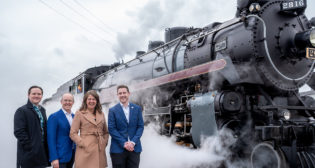
Making the Obvious Less Obscure
Written by William C. Vantuono, Editor-in-Chief
The National Grain and Feed Association stopped short of saying railroad service problems were killing cows, but it did say that “in an effort to continue service for customers during the rail service disruptions, NGFA members have done as much as possible to keep animals fed, but the ability to stretch resources is exhausted and growing more tenuous with each additional day of service delays.”
FROM THE EDITOR, APRIL 2022 ISSUE: A while ago, I wrote a column on the euphemistic language (“words that hide the truth, that conceal reality,” as George Carlin put it) that has invaded corporate America. You know: “Management wanted to curtail redundancies in the human resources area, so many people are no longer viable members of the workforce,” Carlin’s take on “fired” or “laid off.”*
It popped up again, in responses I requested from several Class I’s regarding a letter the National Grain and Feed Association (NGFA) wrote late last month to STB Chairman Marty Oberman complaining about poor railroad service being responsible for problems like malnourished cows. Is that why I probably won’t be grilling steak on my barbecue this summer, because the price of beef will bankrupt me?
Here’s one response I received, within minutes of emailing a request for a statement: “We are committed to supporting our customers and moving forward together amid the ongoing supply chain and labor challenges, which we are actively working to address.”
Such euphemistic, corporate-speak statements that basically say nothing are, as my predecessor Luther S. Miller frequently cited, “The Pope is a Catholic” pronouncements that “make the obvious less obscure.”
Indeed, Luther, as you also frequently said, paraphrasing Jean Giraudoux: “The mediocre are always at their best.”
Capitol Hill Contributing Editor Frank Wilner once again gets the next-to-last word: “The NGFA letter echoes shipper concerns expressed during the STB’s mid-March public hearing on a proposal to implement a reciprocal switching remedy. It goes to the core of Chairman Oberman’s probe of a railroad’s common carrier responsibility—a hazily defined duty of railroads to provide transportation or service on reasonable request.
“Since railroads were first regulated in 1887 as to rates and practices, Congress has never provided a statutory definition of the common carrier responsibility, leaving the four corners of that duty in regulatory and judicial limbo. Many shippers assert railroads are shirking that hazily defined common carrier responsibility for two reasons: One is to demarket freight considered only marginally profitable; the second because the shipper facility or some other aspect of the freight offerings is not compatible with Precision Scheduled Railroading.
“Allegations of freight demarketing are grimily similar to investment funds buying up rent-controlled residential buildings and then cutting services in an effort to drive out the renters with the object of converting the buildings to high-end condominiums for purchase.”
I’ve not identified the railroad with the “Pope is a Catholic” response, because I don’t wish to offend the legions of attorneys who vet everything except pre-sanitized boilerplate language. But a shout-out goes to BNSF for providing a detailed statement, an explanation that actually said something.
In my book, BNSF is really an acronym that stands for “Bulls__t Never Supersedes Frankness.” You can expect nothing less from the Farmer’s mouth!
*Here’s George Carlin’s entire classic routine on euphemistic language:
“I don’t like words that hide the truth, words that conceal reality. I don’t like euphemisms, or euphemistic language. And American English is loaded with euphemisms, because Americans have a lot of trouble dealing with reality. Americans have trouble facing the truth, so they’ve invented a kind of a soft language to protect themselves from it, and it gets worse with every generation. I’ll give you an example of that. There’s a condition in combat. Most people know about it. It’s when a fighting person’s nervous system has been stressed to its absolute peak and maximum. Can’t take anymore input. The nervous system has either snapped or is about to snap. In the First World War, that condition was called shell shock. Simple, honest, direct language. Two syllables, shell shock. Almost sounds like the guns themselves. Then a whole generation went by and the Second World War came along, and the very same combat condition was called battle fatigue. Four syllables now. Takes a little longer to say. Doesn’t seem to hurt as much. Fatigue is a nicer word than shock. Shell shock! Battle fatigue. Then we had the war in Korea, 1950. Madison Avenue was riding high by that time, and the very same combat condition was called operational exhaustion. Hey, we’re up to eight syllables now! And the humanity has been squeezed completely out of the phrase. It’s totally sterile now. Operational exhaustion. Sounds like something that might happen to your car. Then of course, came the war in Vietnam, and thanks to the lies and deceits surrounding that war, I guess it’s no surprise that the very same condition was called post-traumatic stress disorder. Still eight syllables, but we’ve added a hyphen! And the pain is completely buried under jargon. Post-traumatic stress disorder. I’ll bet you if we’d still been calling it shell shock, some of those Vietnam veterans might have gotten the attention they needed at the time.
“But, it didn’t happen, and one of the reasons is because we were using that soft language, that language that takes the life out of life. And it is a function of time. It does keep getting worse. I’ll give you a few more examples. Sometime during my life, toilet paper became bathroom tissue. I wasn’t notified of this. No one asked me if I agreed with it. It just happened. Sneakers became running shoes. False teeth became dental appliances. Medicine became medication. Information became directory assistance. The dump became the landfill. Car crashes became automobile accidents. Partly cloudy became partly sunny. Motels became motor lodges. House trailers became mobile homes. Used cars became previously owned transportation. Room service became guest room dining. And constipation became occasional irregularity. When I was a little kid, if I got sick, I went to the hospital and saw a doctor. Now, I go to a health maintenance organization or a wellness center to consult a healthcare delivery professional. Poor people used to live in slums. Now, the economically disadvantaged occupy substandard housing in the inner cities. And they’re broke! They’re broke! They don’t have a negative cash-flow position. They’re broke! Because a lot of them were fired. You know, fired. Management wanted to curtail redundancies in the human resources area, so many people are no longer viable members of the workforce.”
Finally, here’s my version of railroad corporate-speak:
“We’re executing best-in-class service, and we’re extremely confident that substantial opportunities exist to leverage our service product offering, capture growth and deliver superior financial returns. Our 360-degree view, which incorporates, where appropriate, rationalized right-sizing and/or downsizing initiatives, is focused on strategically deploying disciplined capital investments. We’re working aggressively to implement a remarkable rate of positive organizational change, developing and implementing customer-centric operating strategies by engaging and communicating proactively through frequent interactions with both our internal and external stakeholders about our processes for tighter procedural coordination. In a challenging environment filled with persistent headwinds, we are fully committed to deploying the streamlined resources necessary to address our capacity constraints, while raising the bar on our customer service metrics. Safety is our top priority, followed closely by our commitment to enhancing shareholder value.”



